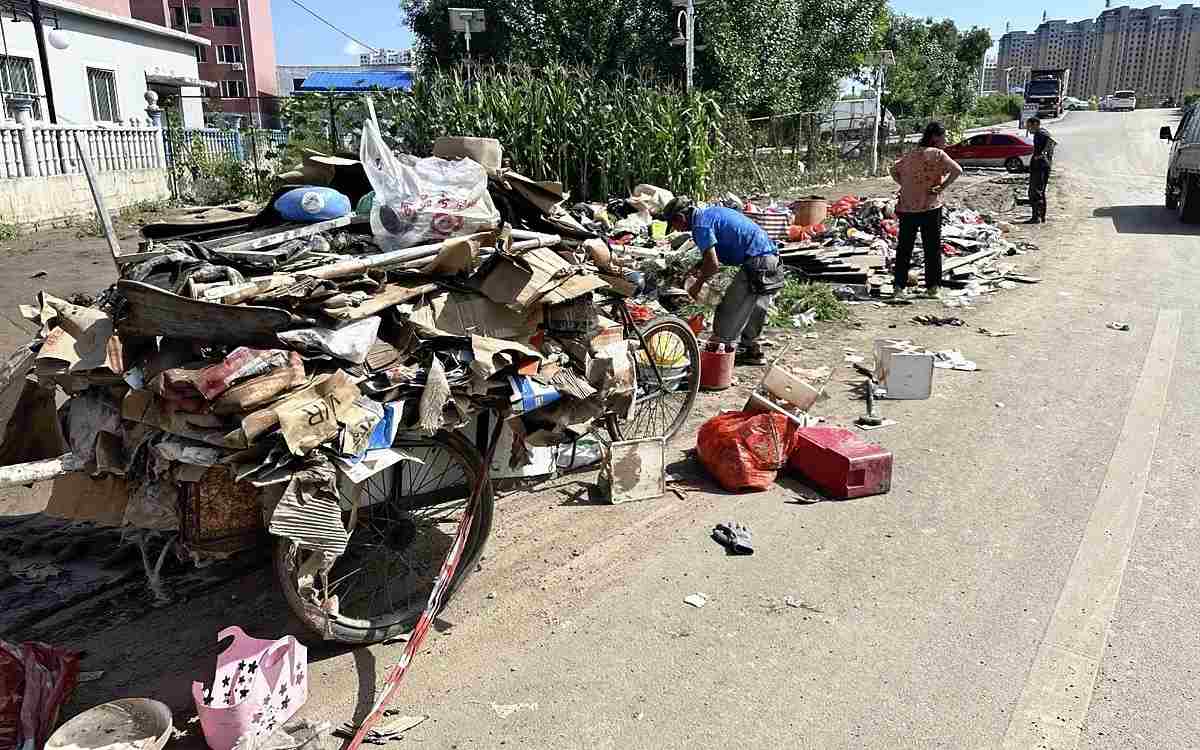China Hit by Series of Torrential Rains; Communist Party Stresses Swift Recovery to Avoid Destabilization

Residents clean up rubble after their homes were damaged in torrential rain in Huludao in China’s Liaoning Province on Friday.
17:07 JST, August 28, 2024
HULUDAO, China — China has been hit by a series of record-breaking heavy rains, leaving more than 300 people dead or missing in the first half of this year. As damage from torrential rains continues to increase alongside climate change, the Chinese Communist Party (CCP), which considers social stability to be its highest priority, has been emphasizing its swift recovery efforts through China’s official media.
Huludao in China’s northeastern Liaoning Province has been hit by record-breaking daily rainfall of more than 500 millimeters since around Aug. 19, and the number of dead or missing people stood at 20 or more as of Friday.
When I visited the city’s affected areas on Friday, residents covered in mud were carrying out restoration works. A woman told me that more than one meter of muddy water had rushed into her home. A foul smell filled the room where mud had stained the interior, and many flies were flying around.
“I’ve been living here for nearly 40 years, but I’ve never seen such heavy rainfall,” said the woman in her 60s before adding, “I don’t know how to carry on with my life from here.”
The Chinese media have been reporting extensively on the state of infrastructure restoration. Meanwhile, local officials have been visiting disaster-hit areas one after another to show their support for the disaster victims.
“We will certainly restore your hometown,” Liaoning Province’s top leader Hao Peng, who is the CCP provincial committee secretary, told the survivors on Aug. 21. He also said that President Xi Jinping has been paying “special attention” to the situation in the disaster-hit areas. It was likely that he was being cautious to avoid a growth of dissatisfaction among the disaster victims, which might turn into criticism of the administration.
The number of people killed or missing due to natural disasters such as flooding and landslides between January and June had more than tripled to 322 this year from the same period last year, according to China’s Emergency Management Ministry. Economic losses mounted to 93.1 billion yuan (approximately ¥1.9 trillion). And in late July, as the second half of the year started, 50 people were killed and 15 people went missing in Zixing, Hunan Province.
The China Meteorological Administration has pointed to the effects of global warming as the reason for frequent weather-related disasters. Its researchers predicted that weather-related disasters would become even more severe by 2050 and warned that “extreme temperatures, droughts and rainfall will tend to become more frequent and stronger.”
The Chinese government has set forth a plan to build cities adapted to climate change. It announced in May that 39 cities, including Beijing and Shanghai, had been selected as model areas. The plan aims to improve infrastructure and fortify cities against disasters. However, the Communist administration is under pressure, as it is difficult to implement advanced measures throughout China’s vast lands.
Top Articles in World
-

China Confirmed to Be Operating Drilling Vessel Near Japan-China Median Line
-

China Eyes Rare Earth Foothold in Malaysia to Maintain Dominance, Counter Japan, U.S.
-

Japan, Qatar Ministers Agree on Need for Stable Energy Supplies; Motegi, Qatari Prime Minister Al-Thani Affirm Commitment to Cooperation
-

North Korea Possibly Launches Ballistic Missile
-

10 Universities in Japan, South Korea, Mongolia to Establish Academic Community to Promote ICC Activities, Rule of Law
JN ACCESS RANKING
-

Univ. in Japan, Tokyo-Based Startup to Develop Satellite for Disaster Prevention Measures, Bears
-

JAL, ANA Cancel Flights During 3-day Holiday Weekend due to Blizzard
-

China Confirmed to Be Operating Drilling Vessel Near Japan-China Median Line
-

China Eyes Rare Earth Foothold in Malaysia to Maintain Dominance, Counter Japan, U.S.
-

Japan Institute to Use Domestic Commercial Optical Lattice Clock to Set Japan Standard Time






















